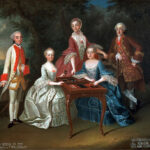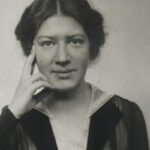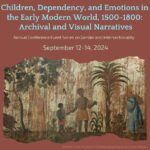 FWF-Projekt „Adelige Geschwister. Vermögensarrangements und soziale Konfigurationen“; Margareth Lanzinger, Claudia Rapberger und Florian Andretsch (Web)
FWF-Projekt „Adelige Geschwister. Vermögensarrangements und soziale Konfigurationen“; Margareth Lanzinger, Claudia Rapberger und Florian Andretsch (Web)
Zeit: 12.-13.09.2024
Ort: Univ. Wien, Universitätsring 1, 1010 Wien
Der Workshop ist die Abschlussveranstaltung des FWF-Projekts, bevor es in die nächste Runde geht. Vorgestellt werden Aspekte der Forschung der letzten drei Jahre, außerdem sollen Anregungen und Inputs für die zukünftige Arbeit gesammelt werden.
Porgramm (PDF)
Do., 12.09.2024
13:00 Uhr: Eintreffen | 13:30 Uhr: Begrüßung
14:00 Uhr: Session I; Chair: Michaela Hohkamp (Hannover)
- Adina Eckart (Leipzig): Lucrezia de’ Medici Salviati (1470-1553). Der Umgang einer Dame mit dem familialen Vermögen in der italienischen Wirtschaftswelt der Renaissance
- Heinrich Lang (Leipzig): Damenwirtschaft ohne Damen: Das prekäre Vermögen der Florentiner Patrizierin und Bankierstochter Costanza Serristori (ca. 1522-1538)
16:00 Uhr: Session II; Chair: Florian Andretsch (Wien)
- Siglinde Clementi (Bozen): Die Wirtschaftsbücher der Landadeligen Maria Cristina von Wolkenstein geb. von Paumgarten, zweite Hälfte 17. Jhd.
- Nathalie Büsser (Zürich): Eine Witwe, «verkehrte Welt» und die Frage nach dem Besitz der Frauen. Ökonomische Tätigkeiten von Frauen in Schweizer Militärunternehmerfamilien (17./18. Jhd.)
- Waltraud Schütz (Wien): „Sage mir, mit welchem Gelde ich deine Schulden zahlen kann“. Das Schreiben über Finanzen in Briefen adeliger Schwestern im frühen 19. Jhd. Continue reading

 Waschsalon Nr. 2
Waschsalon Nr. 2  Bonn Center for Dependency & Slavery Studies (BCDSS); Joseph Biggerstaff, Susan Broomhall, Kristie Flannery, Claudia Jarzebowski, Jessica O’Leary, and Lisa Phongsavath
Bonn Center for Dependency & Slavery Studies (BCDSS); Joseph Biggerstaff, Susan Broomhall, Kristie Flannery, Claudia Jarzebowski, Jessica O’Leary, and Lisa Phongsavath